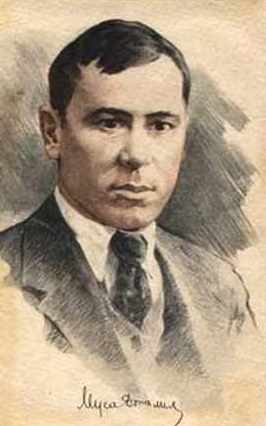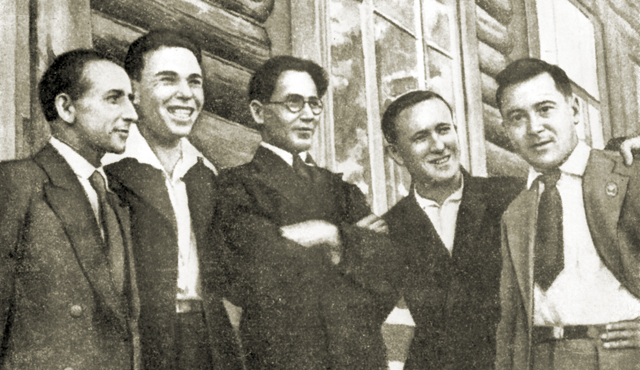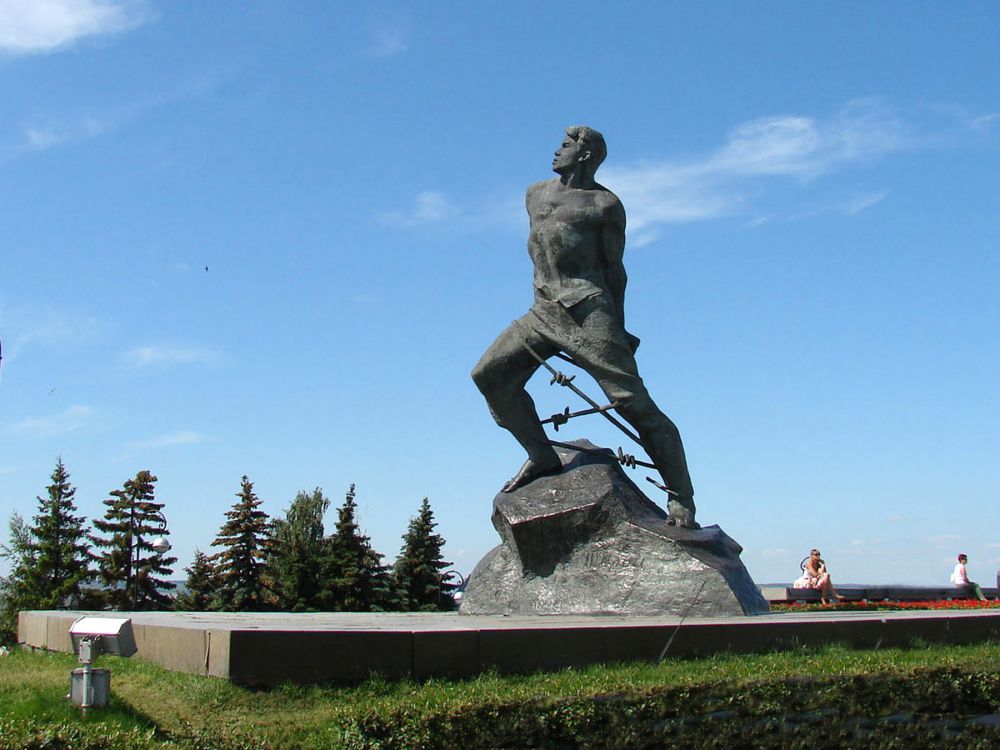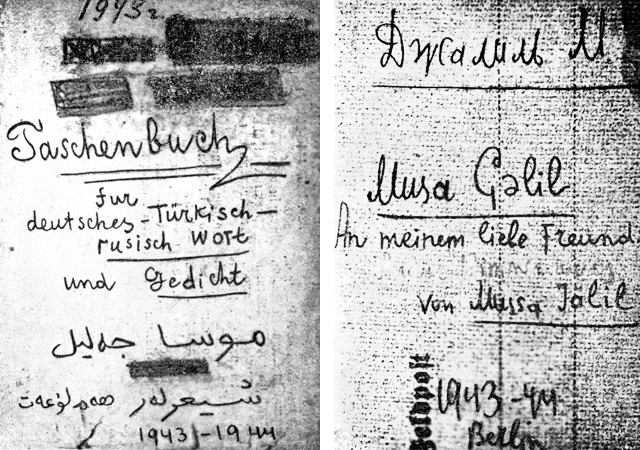"Moabit notebook" of Musa Jalil
Share:

As a rule, almost all writers, poets and artists we secret rule, refer to "people with a difficult fate, implying their particular mental state that differs from ours. One of them was indeed deeply unhappy, and someone simply dressed in Cape disappointment and suffering, while maintaining the image of the creator with a heavy fate emerging during the centuries. However, the poet, of which we now talk about was indeed tragic fate has not exaggerated nor human rumor, nor the researchers. The name of this great man-Musa Jalil.
His character strongly “born” since childhood, because with the very young years and until his death, Musa Jalil always struggled. At first struggled with destitution and hunger, then with the enemies of the homeland, which passionately and devotedly loved, so much so that, even once captured by Nazi soldiers, asked her forgiveness:
Forgive me, your privates
The smallest part of your.
I'm sorry for what I did not die
The death of a soldier in a hot battle.
He was born in the village of Mustafino, Orenburg province February 15, 1906 year, quoting Sergei Yesenin, "in a simple peasant family.Mustafa Jalilov, father of Musa Jalil, was at pains to make the lives of his family, less severe, but it did not work. On several occasions he had to sell a plot of land in the village and move to the city in search of work and food, then again in the village, in the hope that agricultural work will bring rich fruits. But the family of Musa Jalil before the revolution and didn't recognize what it is to live, not needing anything. Yes, and after the life of the poet has not spoiled, but he never complained about it, with tremendous force of nature.
Despite poverty, bordering extreme destitution, Mustafa Jalilov still insisted on education, which had to get his children. So first the elder brother Musa Jalil Ibrahim, and then himself, were given in madrasas.He loved poetry of Gabdulla Tukay, reading and remembering all of his poems which I could find. In search of folk art and wisdom, he turned to his grandmother, who told him Gil′mi folk tales, which also will have a great influence on his work.During the first world war, Musa Cälil, despite his young age, will not remain aloof from its events: to him, presenting information write would approach villagers with requests to write a letter to "front", and, according to the custom of those years, attributed at the end of the folk song to support distant soldier deprived home warmth.Often the future poet himself pitched similar songs-that's beneficial effect of grandmother's stories.

From left to right: Tatar writers and poets
Sibgat Hakim, Usman Al′meev, Bayan Nur, Jawdat Fayzi, Musa Jalil. 1939.
About the life of Musa Jalil can write very much and for a long time, such a bright, saturated, faithful to the Homeland and the people she was. He wrote many wonderful lyrical and patriotic poems, poems and plays. But "Moabit notebook" was the peak of his book creativity, endured blood true that read without shivering impossible.
There are hands, feet, everything as if whole,
I have body and soul.
And there is only freedom! Here's the deal!
Me hard live, breathing forcibly.

Monument To Musa Jalil (Kazan)
"Moabit notebook"-cycle of poems Musa Jalil, written by them, being imprisoned in Moabit prison. In the year 1942 Musa Jalil was captured by Nazi soldiers, and never returned to his homeland alive. At first he was held in a concentration camp, and when they learned that he is a famous poet, head of warriors and hero, moved to Berlin, where he tried to lure to his side, and after realizing the futility of their attempts-in Moabit prison. To his contemporaries from the prison got two small, no bigger than a human Palm, notebook of poems, overestimate which is not possible. On the last page of the Musa Cälil wrote an appeal to those who will get his notebook: "a friend who can read tartare and read this book. It is written by the famous Tatar poet Musa Jalil. His story is that he was born in the year 1906. Has an apartment in Kazan and Moscow. At home is considered one of the great poets. He in 1942 year fought on the front line and captured. In captivity tested all the horrors, passed through forty deaths, then was brought to Berlin. Here he was accused of involvement in the illegal organization, distributing Soviet propaganda and imprisoned. It awarded the death penalty. He will die. But it will remain written in verses 116 captive and imprisoned. He cares for them. He therefore from 116 tried to rewrite at least 60 poems. If this book gets into your hands, gently, carefully rewrite them to make them save your precious, and after the war tell in Kazan, release them in the light of verses of the deceased poet of the Tatar people. This is my last will and Testament. Musa Jalil. 1943. December.
In " Moabit notebook " many fine poems, tragic, deep, penetrating, but one of his poem entitled "Barbarism" will cause and people the harshest flinch from a real sense of human cruelty, not knowing the limits:

They have collected,
Calm before the pain,
Children and women.
And kicked out into the field.
And pit yourself
These women dug.
The Nazis stood,
Watched joked.
Then near the pit
Have put in a number
Jaded women
And sickly children.
Musa Cälil knew firsthand what war and fought for his homeland, but he never glorified it, called "good deed", because there is nothing worse than war, when brother goes to brother, and lost human qualities. How can we justify the killing of children? What could be worse than the time at which a mother forced to see their children's death or die along with them? There is no excuse and no arguments here would have been inappropriate.
Bending down, took his
At the hands of his mother,
Pressed to his chest:
Well fear not, now
Will not light,
My little, us ...
No, I will not hurt ...
Instant death.
Close your eyes only,
No need to watch.
…. The first book of poetry moabit delivered from prison prisoner Gabbas Shariyapov and second-neighbor Musa Jalil on camera-André Timmermans, who along with the notebook and sent his personal belongings at the Soviet Consulate, after the war, in 1947 year. A prominent Azerbaijani poet Samad Vurgun in the meeting dedicated to the tenth anniversary of the death of Musa Jalil, said: "the world and world literature knows many poets, undeaden their names Unfading Glory, but such as the poet-protagonist of the Musa Cälil, immortalizing their name and immortal creations and death, which is itself a heroic feat, not so much. Here they are: great Byron, glorious Hungarian national poet Petefn, hero Julius Fucik and finally, Musa Jalil. More commendable creativity Musa Jalil and submit you cannot, so we are adding nothing and does not therefore, finish your story on this optimistic note.
Nailya Galeeva
Share: